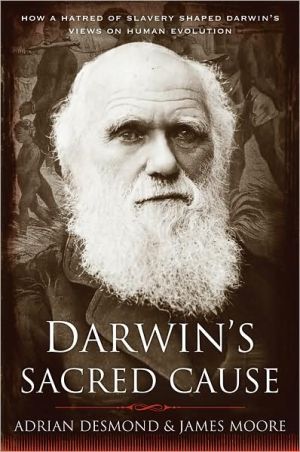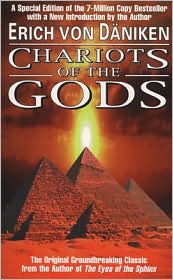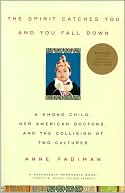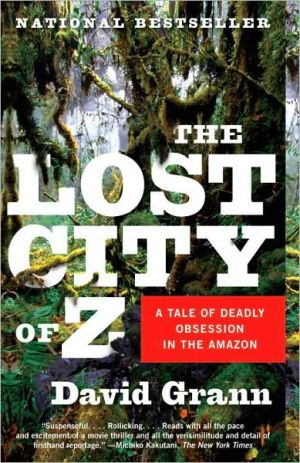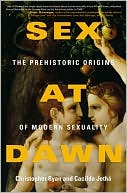Darwin's Sacred Cause: How a Hatred of Slavery Shaped Darwin's Views on Human Evolution
An astonishing new portrait of a scientific icon\ In this remarkable book, Adrian Desmond and James Moore restore the missing moral core of Darwin’s evolutionary universe, providing a completely new account of how he came to his shattering theories about human origins.\ There has always been a mystery surrounding Darwin: How did this quiet, respectable gentleman, a pillar of his parish, come to embrace one of the most radical ideas in the history of human thought? It’s difficult to overstate...
Search in google:
An astonishing new portrait of a scientific icon In this remarkable book, Adrian Desmond and James Moore restore the missing moral core of Darwin's evolutionary universe, providing a completely new account of how he came to his shattering theories about human origins. There has always been a mystery surrounding Darwin: How did this quiet, respectable gentleman, a pillar of his parish, come to embrace one of the most radical ideas in the history of human thought? It's difficult to overstate just what Darwin was risking in publishing his theory of evolution. So it must have been something very powerful-a moral fire, as Desmond and Moore put it-that propelled him. And that moral fire, they argue, was a passionate hatred of slavery. To make their case, they draw on a wealth of fresh manuscripts, unpublished family correspondence, notebooks, diaries, and even ships' logs. They show how Darwin's abolitionism had deep roots in his mother's family and was reinforced by his voyage on the Beagle as well as by events in America-from the rise of scientific racism at Harvard through the dark days of the Civil War. Leading apologists for slavery in Darwin's time argued that blacks and whites had originated as separate species, with whites created superior. Darwin abhorred such "arrogance." He believed that, far from being separate species, the races belonged to the same human family. Slavery was therefore a "sin," and abolishing it became Darwin's "sacred cause." His theory of evolution gave all the races-blacks and whites, animals and plants-an ancient common ancestor and freed them from creationist shackles. Evolution meant emancipation. In this rich and illuminating work, Desmond and Moore recover Darwin's lost humanitarianism. They argue that only by acknowledging Darwin's Christian abolitionist heritage can we fully understand the development of his groundbreaking ideas. Compulsively readable and utterly persuasive, Darwin's Sacred Cause will revolutionize our view of the great naturalist. The New York Times - Christopher Benfey Darwin's power, according to Desmond and Moore, lay in his marshaling an argument for the unitary origin and hence "brotherhood" of all human beings, and this, they argue, is precisely what Darwin achieved in The Origin of Species and later in The Descent of Man. The case they make is rich and intricate, involving Darwin's encounter with race-based phrenology at Edinburgh and a religiously based opposition to slavery at Cambridge.
Introduction: Unshackling Creation\ Global brands don’t come much bigger than Charles Darwin. He is the grizzled grandfather peering from book jackets and billboards, from textbooks and TV the sage on greeting cards, postage stamps and commemorative coins. Darwin’s head on British £10 notes radiates imperturbability, mocking those who would doubt his science. Hallow him or hoot at him, Darwin cannot be ignored. Atheists trumpet his ‘atheism’, liberals his ‘liberalism’, scientists his Darwinism, and fundamentalists expend great energy denouncing the lot. All agree, however, that for better or worse Darwin’s epoch-making book On the Origin of Species transformed the way we see ourselves on the planet. How did a modest member of Victorian England’s minor gentry become a twenty-first-century icon? Celebrities today are famous for being famous, but Darwin’s defenders have a different explanation. To them Darwin changed the world because he was a tough-minded scientist doing good empirical science. As a young man, he exploited a great research opportunity aboard HMS Beagle. He was shrewd beyond his years, driven by a love of truth. Sailing around the world, he collected exotic facts and specimens most notably on the Galapagos islands and followed the evidence to its conclusion, to evolution. With infinite patience, through grave illness heroically borne, he came up with ‘the single best idea anyone has ever had’ and published it in 1859 in the Origin of Species. This was a ‘dangerous idea’ evolution by ‘natural selection’ an idea fatal to God and creationism equally, even if Darwin had candy-coated this evolutionary pill with creation-talk to make it more palatable. Evolution annihilated Adam; it put apes in our family tree, as Darwin explained in 1871 when he at last applied evolution to humans in The Descent of Man. Secluded on his country estate, publishing book after ground-breaking book, Darwin cut the figure of a detached, objective researcher, the model of the successful scientist. And so he won his crown. The most that can be said for this caricature is the number of people who credit it. Not only evolutionists and secularists, but many creationists and fundamentalists see Darwin’s claim to fame or infamy in his single-minded pursuit of science. Doggedly, some say obstinately, he devoted his life to evolution. A zeal for scientific knowledge consumed him, keeping him on target to overthrow God and bestialize humanity. Brilliantly, or wickedly, Darwin globalized himself. By following science and renouncing religion, he launched the modern secular world. This isn’t just simplistic; most of it is plain wrong. Human evolution wasn’t his last piece in the evolution jigsaw; it was the first. From the very outset Darwin concerned himself with the unity of humankind. This notion of ‘brotherhood’ grounded his evolutionary enterprise. It was there in his first musings on evolution in 1837. Today we are beset by polemics of every stripe, comic attempts to pummel Darwin into this shape or that, to convict or acquit Darwin of beliefs atrocities even associated with his name. (A recent title about German history says it all: From Darwin to Hitler.) To reverse Marx’s dictum for a moment: the point is not to change Darwin, the point is to understand him. Darwin was neither saint nor satan. Looked at in his own day, he was complex, sometimes even contradictory, never quite as one imagined, but vastly more interesting and informative. And the real story behind his journey to evolution human evolution is much richer than anyone realizes. It is a story we have been piecing together for years, trying to grasp what could have made this gentle naturalist such an anomaly in his age, and so determined in the face of overwhelming odds.
IllustrationsIntroduction Unshackling Creation1 The Intimate 'Blackamoor' 12 Racial Numb-Skulls 273 All Nations of One Blood 494 Living in Slave Countries 685 Common Descent: From the Father of Man to the Father of All Mammals 1116 Hybridizing Humans 1427 This Odious Deadly Subject 1728 Domestic Animals and Domestic Institutions 1999 Oh for Shame Agassiz! 22810 The Contamination of Negro Blood 26711 The Secret Science Drifts from Its Sacred Cause 29712 Cannibals and the Confederacy in London 31713 The Descent of the Races 348Notes 377Bibliography 422Index 457
\ Christopher BenfeyDarwin's power, according to Desmond and Moore, lay in his marshaling an argument for the unitary origin and hence "brotherhood" of all human beings, and this, they argue, is precisely what Darwin achieved in The Origin of Species and later in The Descent of Man. The case they make is rich and intricate, involving Darwin's encounter with race-based phrenology at Edinburgh and a religiously based opposition to slavery at Cambridge.\ —The New York Times\ \ \ \ \ Thomas HaydenIn lesser hands, this recasting of Darwin's life as an extended anti-slavery campaign could seem like a stretch, perhaps to justify a book for the Darwin-Lincoln double anniversary. But Desmond and Moore, professional historians of science who are widely regarded as Darwin's finest biographers, barely mention Lincoln (though they do show Darwin reading the news of America's Civil War with great interest). More to the point, the authors follow Darwin's example by deciding that the best way to prove a controversial point is "to pile on crippling quantities of detail." Drawing on his manuscripts, notebooks, letters and even marginal jottings in books, they construct a theory of both broad scope and meticulous documentation, leaving critics with few holes to probe.\ —The Washington Post\ \ \ Publishers WeeklyWho better than Desmond and Moore, Darwin's acclaimed biographers, to bring a fresh perspective to Darwin's central beliefs? "No one," they say, "has appreciated the source of that moral fire that fuelled his strange, out-of-character obsession with human origins." This masterful book produces a perspective on Darwin as not only scientist but moralist. Darwin's deep abolitionist roots, say the authors, led him to ask the questions he did. Homing in on Darwin's moral and intellectual formation, and drawing on notebook jottings and marginalia, Desmond and Moore argue persuasively that the centerpiece of Darwin's work was demonstrating the "common descent" of all human races, using science rather than activism to subvert the multiple origins view promoted by slavery's advocates. His humanitarian approach to science, the authors say, makes him more of a moral agent than his critics would concede, while the moral drive behind his science goes against today's ideal of disinterested scientific objectivity. Desmond and Moore build a new context in which to view Darwin that is utterly convincing and certain to influence scholars for generations to come. In time for Darwin's bicentennial, this is the rare book that mines old ground and finds new treasure. (Jan. 28)\ Copyright © Reed Business Information, a division of Reed Elsevier Inc. All rights reserved.\ \ \ \ \ Library JournalPerhaps because he left behind such an extensive chronicle of his own writings, Darwin, the man, has inspired abundant literature aiming to understand the workings of his mind, his personal passions, and his inner demons; for example, the authors' The Life of a Tormented Evolutionist. In a similar vein, their newest book reinterprets much of his life work as having been motivated by an altruistic humanitarian vision and an equally intense abhorrence of slavery. Drawing from a wealth of documentary sources from the era, they explore how the Enlightenment's scientific objectivity coexisted with colonial racism and how Darwin uniquely honed his science according to a set of values that he hoped could provide a transcendent vision of a "great human family," as presented in The Descent of Man. Well researched, likely to be controversial (some will call it revisionist history), this book provides another enlightening glimpse into a life of seemingly infinite complexity.\ \ —Gregg Sapp\ \ \ \ \ Kirkus ReviewsCo-authors of the massive Darwin (1992) offer a new take on the impetus for his theory of evolution: It was "moral passion," rather than the force of observed, recorded and analyzed facts, that fired his work. Darwin grew up in an abolitionist culture, Desmond and Moore demonstrate. Both of his grandfathers, Josiah Wedgwood and Erasmus Darwin, were ardent supporters of the antislavery movement, and his older sisters firmly instilled its message in him. Add to this the impact of his teenage apprenticeship in taxidermy to a freed slave, "a very pleasant and intelligent man," and his shocking encounters with the brutality of human bondage during his years on board the Beagle. Drawing heavily on unpublished correspondence and Darwin's notes about and early drafts of On the Origin of Species, the authors argue that it was abhorrence of slavery that led this country gentleman to risk his reputation in a conservative society by linking all races to a common, more primitive ancestor. They show Darwin working out his theory of sexual selection as the means by which human races became differentiated. In recounting the development of his theories, and his reservations about presenting them and exposing himself to society's wrath, the authors supplement the history of science with the history of slavery and racism in the 19th century. They cite and quote from the work of James Cowles Prichard, John Bachman, Sir Charles Lyell, Asa Gray and Louis Agassiz, among others. Modern readers may be startled by Victorians' openly racist language and the general assumption-among men of science as well as religious figures and political leaders-that whites, especially Englishmen, were superior. Championingthe abolition of slavery did not mean accepting blacks as intellectual or cultural equals, and Darwin was apparently no exception to this general rule. Stimulating, in-depth picture of 19th-century scientific thinking and racial attitudes.\ \
